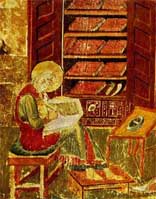| Profile | Major Works | Resources |
Flavius Magnus Aurelius Cassiodorus Senator, c.485-c.585.
Late Roman historian and civil servant in Ostrogoth Italy, Cassiodorus was a critical figure in transmitting Classical knowledge into the Middle Ages.
Flavius Magnus Aurelius Cassiodorus originated from a Roman senatorial family in Scyllacium (Squillace, Calabria), southern Italy, shortly after the fall of the western Roman Empire in 476. Following his father's footsteps, Cassiodorus entered a career in the civil service of the Ostrogothic kingdom of Italy, beginning as quaestor in 507 at a young age (as a result, some estimate his birth to be earlier, in 477 or even 470). After climbing through the Gothic bureaucracy, Cassiodorus availed himself of the fall of Boethius in 523 to become magister officium, head of the civil service of Theodoric the Great, Ostrogoth king of Italy. After Theodoric's death in 526, Cassiodorus stayed on as the head of the bureaucracy for his daughter Amalsontha, regent on behalf of her young son king Athalaric. After Amalontha's deposition in 535, Cassiodorus still continued to hold positions in the new administration. During this political period, Cassiodorus wrote several works glorifying the Gothic Italian state, including a chronicle of Italy up to 519, a history of the Goths (now lost) and a collection of state papers (Variae).
The advent of the devastating Byzantine-Gothic wars in Italy in 535, and subsequent disorder, prompted Cassiodorus to retire from public life around 540, and moved to his family estate in Calabria, and subsequently to Constantinople. Before leaving, Cassiodorus set up a monastery at Vivarium (location uncertain, prob. on family estates near Catanzaro, Calabria). Cassiodorus spent a quiet decade in Constantinople, primarily writing ecclesiastical works (he wrote his appendix on the soul, a Church history and commentaries on the Psalms and epistles in this period), before returning to Italy and entering his own monastery in 554.
In the hopes of preserving what remained of Classical thought in crumbling Italy, Cassiodorus stocked the Vivarium monastery with his own private library, and set his monks at translating, summarizing and copying whatever books they could find from Greek and Latin sources. To overcome the wariness of the Church towards pagan Classical literature, in his letters and works, notably the Institutiones (c.543-55), Cassiodorus promulgated the usefulness of a Classical education, however pagan, as preparatory for the proper study of Christian theology. In the Institutiones and his follow-up De artibus (c.560), Cassiodorus outlined a program of education in the 'Seven Liberal Arts', harking back to Capella, pointing to the existing Classical books and sources that probably could and should be read safely.
It is to Cassiodorus whom is owed the long association between monasteries and books. His De orthographia (c.570) was a writing handbook for his monks. Cassiodorus's example at Vivarium (at least the book-copying bit) was taken up with fervor by the Benedictine monastery of Monte Cassino not long after, and would eventually spread across European monasteries in the 9th C.
|
Major Works of Cassiodorus
|
|
HET
|
Resources on Cassiodorus
|
All rights reserved, Gonšalo L. Fonseca

